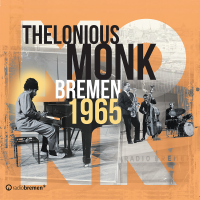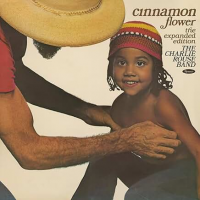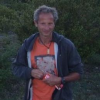Home » Jazz Musicians » Charlie Rouse
Charlie Rouse
Though a top tenor man in his own right, he will always be remembered as the saxophonist for the Thelonious Monk quartet. He adapted his playing to Monk’s music; his tone became heavier, his phrasing more careful, and he seemed to be the medium between Monk and the audience.
Charlie Rouse studied clarinet before taking up tenor saxophone. He played in the bop big bands of Billy Eckstine (1944) and Dizzy Gillespie (1945), but made his first recordings as a soloist only in 1947, with Tadd Dameron and Fats Navarro.
After playing rhythm-and-blues in Washington and New York, he was a member of the Duke Ellington Orchestra (1949-50) and Count Basie's octet (1950). He took part in Clifford Brown's first recordings in 1953, then worked with Bennie Green (1955) and played in Oscar Pettiford's sextet (1955); with Julius Watkins, also one of Pettiford's sidemen, he led Les Modes (later the Jazz Modes), a bop quintet (1956-59). He joined Buddy Rich briefly before playing in Thelonious Monk's quartet (1959-1970), the association for which he is best known.
In the 1960s Rouse adapted his style to Monk's work, improvising with greater deliberation than most bop tenor saxophonists, and restating melodies often. His distinctive solo playing with Monk may be heard on the classic recordings in the bands heyday.
Though he would go on to do some solo projects, they were very selective and he opted for quality over quantity. His first outing as leader was “Taking Care of Business,” (1960) for this overdue debut, he selected trumpeter Blue Mitchell, and a rhythm section of pianist Walter Bishop and bassist Earl May, and Art Taylor on drums.
During the 1970s he worked as a freelance, and recorded three albums as a leader. The album "Two is One" was recorded in 1974 for Strata East. Charlie in 1977 did “Moments Notice,” and enlisted the help of some top crack Brazilian locals for “Cinnamon Flower.” Dom Salvador, Amaury Tristao, Dom Um Romao, Portinho and Claudio Roditi were hooked up with some of NYCs finest-Ron Carter,Bernard Purdie and Clifford Adams. This was a highlight album for Rouse in that period, very well received.
In the early 1980s he was a member and joint leader of the quartet Sphere, which was dedicated to the performance of Monk's music. He recorded other albums as “Social Call,” (’84) where he joined up with Red Rodney. His offering of “Epistrophy,” (1988) was his tribute to Monk.
Read moreTags
Thelonious Monk: Bremen 1965

by Pierre Giroux
The first official release of the Bremen concert, carefully remastered from the original tapes, is more than just an archival curiosity; it is a revelation. Recorded on an evening characterized by generous tempos and a relaxed exchange, Bremen 1965 reaffirms Thelonious Monk and his experienced quartet as they pay their most fundamental tributes: the uneven poetry of his time, the crystalline bite of Charlie Rouse's tenor saxophone, the steady ballast of Larry Gales's bass, and Ben Riley's propulsive subtleties on ...
Continue ReadingCharlie Rouse: Cinnamon Flower : The Expanded Version

by Pierre Giroux
Cinnamon Flower: The Expanded Edition is a reissue of The Charlie Rouse Band's 1977 Brazilian-inspired album originally released by Douglas Records. Now, nearly 50 years later, Resonance Records presents a deluxe, definitive edition of the album featuring previously unreleased versions of the songs from the original release. Recorded during a prolific period in Rouse's post-Thelonious Monk career, this project reveals a rarely heard side of the tenor saxophonist: a rhythmic sensuality and melodic elegance inspired by Brazil's vibrant music scene. ...
Continue ReadingClifford Jordan: Drink Plenty Water

by Pierre Giroux
Clifford Jordan, the iconic American jazz tenor saxophonist, has left an indelible mark on the world of jazz. Known for his dynamic playing style and innovative compositions, his album Drink Plenty Water and Walk Slow is a testament to his unparalleled musical prowess. The original album was recorded in 1974 for Strata-East as an LP but did not make it to the catalogue during this period. However, his wife, Sandy Jordan, unearthed this gem, which was remastered for presentation in ...
Continue ReadingClifford Jordan: Drink Plenty Water

by Dave Linn
In August 1974, Clifford Jordan entered the studio for what was to be the follow-up to his acclaimed 2-LP set, Glass Bead Games (1973) for his third album on the Strata-East label. Sadly, the label folded in 1975, and the album was never released. Now, 49 years later, Drink Plenty Water, has finally seen the light of day. It is a time capsule of that collaborative era when jazz stretched its boundaries. It features an all-star roster with a front ...
Continue ReadingThelonious Monk: Palo Alto

by Mike Jurkovic
Earth-shattering? The best live Thelonious Monk recording ever? Who knows? Probably not. But it is Monk, so Palo Alto, comes to us with all the scholarly fandom brouhaha we accord these wonderful little things that gratefully drop in our laps from troubled time to troubled time. For anyone not paying attention to the jazz chatter of late, the backstory to Palo Alto thumbnails broadly like this: It is 1968 which, as it just so happens, is another troubled ...
Continue ReadingCharlie Rouse: Bossa Nova Bacchanal – 1962

by Marc Davis
What a happy record! And what a delightful change from the usual 1960s Blue Note formula. You know the drill. In the 1960s, Blue Note was the go-to label for two kinds of jazz: hard bop and soul-jazz. But Blue Note was never the reigning bossa nova label. When the Brazilian phenomenon swept the jazz world in the early 1960s, Verve was the capital of bossa nova, and Stan Getz was its main disciple. So it ...
Continue ReadingThelonious Monk: The Classic Quartet

by Chris May
Intermittently available over the years on various labels and in various guises (most recently as Thelonious Monk Quartet in Japan and 1963: In Japan), this album catches Monk on the cusp between his unflaggingly inventive, mould-breaking Riverside years and his less consistently exploratory, later period with CBS.
Clocking in at just over 38 minutes, The Classic Quartet is a set the group recorded for Japanese TV during a short tour of the country in May, 1963. The sound, enhanced from ...
Continue ReadingWatkins and Rouse's Jazz Modes

Source:
JazzWax by Marc Myers
Yesterday I posted about the Jazz Lab, a little-known, short-lived East Coast jazz quintet co-led by Gigi Gryce and Donald Byrd in 1957. Today, continuing with my series on jazz supergroups of the mid-1950s, I'm turning to Les Jazz Modes, a little known quintet co-led by French hornist Julius Watkins and tenor saxophonist Charlie Rouse that began a year earlier than the Jazz Lab and lasted a year later. Much of the original material the group recorded was composed and ...
read more
Charlie Rouse's Legacy Lives on Through Internet Radio and New Club

Source:
Rouse Public Relations
WHRR House of Rouse Radio plays JAZZ 24 hours a day, 7 days a week with one of the largest jazz collections in the world.
Chico's House of Jazz, located at 631 Lake Avenue Asbury Park, NJ is slated to be New Jersey's # 1 Jazz Night Spot. WHRR and Chico's House of Jazz were created by Charles “Chico" Rouse on behalf of his father, the legendary tenor saxophone player, Charles Rouse, Sr.
Charles Rouse Sr. has graced many classic ...
read more
































